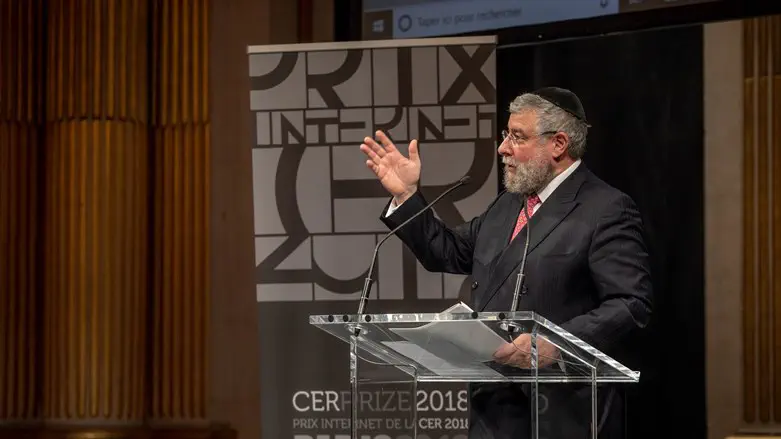
Rabbi Pinchas Goldschmidt was the Chief Rabbi of Moscow, Russia and served as president of the Conference of European Rabbis (CER), which unites over seven hundred communal rabbis from Dublin, Ireland to Khabarovsk, in the Russian Far East.
With the Jewish people about to enter the Land of Israel, Moshe provides them with guidance on political structure and theory, including the separation of powers. But perhaps even more importantly, he teaches us about how those in each “branch” of society need to relate to each other – and that guidance could, if we actually followed it, help defuse one of the most explosive issues affecting modern Israel today—the haredi draft.
This week’s Parsha, Shoftim, is chock-full of commandments, similar to some extent to Parshat Mishpatim. But unlike that Parsha in the Book of Exodus, which discusses laws regulating relations between people, Shoftim discusses laws relating to the soon-to-be-born Jewish state. Even before political theorists like John Locke – or for that matter, Aristotle – the Torah discusses the idea of separation of powers, with each of four branches of governance in Israel – the King, the Prophet, the Judges, and the Clergy – responsible for a different aspect of society and law.
The King is in charge of the army and general governance; the Prophet is the conduit of Divine guidance; the Judges adjudicate disputes and try criminals; and the Clergy guides the people in their service of G-d, especially Temple offerings.
Each of these branches are required to follow regulations and laws – many of them limiting their power and ensuring a proper balance. Laws relating to the King include determining who is eligible to be appointed king, how much money and how many wives he is allowed to have, and that he needs to carry a Torah scroll around with him. Laws that relate to the Prophet forbid him from prophesying falsely, and subjecting him to the death penalty if he does. Other laws relate to judges – that they may not take bribes, that decisions may not be rendered by a single judge (Jewish law requires a minimum of three judges to decide monetary disputes, and 23 for capital cases), and that the highest court (the Sanhedrin) has the last word.
And while the Clergy enjoys certain privileges in exchange for their work in the Temple – including gifts of food from the people to support them – they are not to take part in the conquest or settling of the Land. They remain on the sidelines as the other tribes fulfill their mission of entering and settling Canaan. In addition, donors – who are required to give priestly gifts of terumot, ma’asrot, and other offerings to the Cohanim (Priests) and Levi’im – are free to give them to any member of the clergy they want, and to not give to those whom they don’t want to support.
Those laws on how the people and Clergy interact can guide us on dealing with a very modern and very thorny problem - that of the haredi draft. Many of those in the haredi community who refuse to serve in the IDF cite Maimonides (Rambam), who compares Torah scholars to Levites. Just as those who served the community in the Temple did not go out to war, so do Torah scholars in the modern era; that’s why today most haredim have an exemption from Israeli military service.
The principles laid out in the Parsha on how Levites, Cohanim – and, following the cited dictum, Torah scholars – need to relate to society, are clear. The clergy is there to spiritually serve the people, but spirituality aside, they need to eat – and the only way they get to eat is by building relationships with ordinary Jews who they befriend, and who will support them with the priestly gifts. In order for them to eat, they need to get someone to like them; and for that kind of relationship, they need to provide potential benefactors with something in return.
In other words, it’s a cooperative effort; the clergy guides the people, and the people support the clergy - and that support is given to those clergy whom the people feel did something positive for them, the community, or the Jewish people. If we follow that example, then modern Levites – Torah scholars – need to do something for “the people” if they expect the people’s society to support them.
I was once invited to a sheva brachot (post-wedding feast) of a young Israeli haredi couple right after the beginning of the war, and I listened very carefully to the speeches at the sheva brachot. The war which engulfed all of Israel was not mentioned at all. It was as if they lived on a different planet.
Our historical experiences have taught us to be “insularity experts,” oblivious sometimes to tectonic shifts in the world around us; this helped us to survive millennia of exile and discrimination. However, as the Jewish people are again struggling with existential threats, as hostages are being killed by our enemies, as the military cemeteries are becoming filled with the young people who gave up their lives to protect our lives, I think that those who consider themselves the modern Priests and Levites have an obligation to show empathy, emotional support and engagement with the general population. The feeling of entitlement, of taking without giving, is contrary to the most fundamental teachings of the Torah.
The Torah limits and puts constraints on power. As Lord Acton once was put it, “Power tends to corrupt, and absolute power corrupts absolutely.” Our Parsha shows that even the most powerful and influential in society are limited in what they can do – and that they are required to observe the rules of society, ensuring benefits for all.